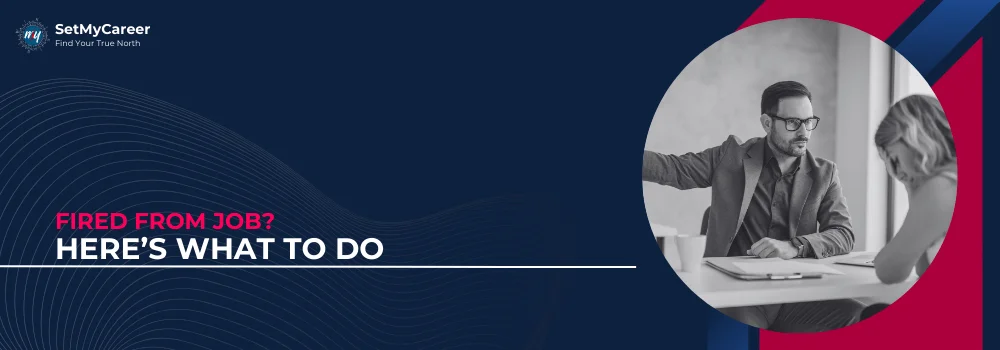
Published by Dr. Nandkishore Rathi on 19 March 2025
Chief Career Navigator
Dr. Nandkishore Rathi is passionate about identifying people's passions and helping them create and lead successful and fulfilling careers. With 30+ years of experience and interactions with thousands of students, academicians, and corporate executives, he has developed a range of career services aimed at benefiting individuals seeking a breakthrough in their professional lives.
This blog explores 7 key strategies to turn your job loss into a career comeback.

Losing a job can be a deeply unsettling experience, especially in a professional landscape as competitive as India’s. Whether it was due to performance issues, company downsizing, or an unexpected policy change, being fired can feel like a personal failure. But here’s the truth: it’s not the end of your career—it’s a transition and one that many successful professionals have navigated before. The key is to process the setback, learn from it, and take proactive steps toward rebuilding your professional path. Let’s explore how you can move forward with confidence and resilience.
Rebuilding your career after being fired is entirely possible with the right mindset and actions. Many professionals bounce back by refining their job search strategy, expanding their professional network, and improving their skills. Whether through further education, new certifications, or simply gaining experience in a different way, you can demonstrate your growth and adaptability. Employers value resilience and the ability to learn from setbacks, so focusing on your progress rather than the past will help shape a strong career narrative. The key is to stay proactive—keep moving forward, keep learning, and remember that one job loss does not define your future.
Getting clarity on your termination can help you plan your next steps. Here are some important questions to ask your employer:
What is the official reason for my termination? This helps you frame your narrative in future interviews.
Can I receive a letter of recommendation or experience certificate? If your firing was due to downsizing or restructuring, your employer may still be willing to provide a positive reference.
What happens to my benefits? Inquire about final salary payments, provident fund (PF) withdrawals, health insurance, and gratuity.
Am I eligible for severance pay? Some companies offer severance packages—knowing your entitlements is essential.
Can I reapply in the future? Some companies allow former employees to return after a set period.
How can I ensure a smooth transition? Ask about knowledge transfer requirements and exit formalities.
Once you’ve had a moment to process the news, it's time to take control of your next steps. Here's what you should do:
Ask for your termination letter, experience certificate, relieving letter, and final settlement details. These documents are often required for future job applications.
Ensure you receive all dues, including unpaid salary, bonuses, provident fund (PF), and gratuity.
If possible, ask a manager or colleague for a recommendation letter. Even if you were let go, your past contributions may still be acknowledged.
Tailor your resume to highlight achievements and skills rather than focusing on the job loss.
Update your LinkedIn headline and summary to reflect your expertise rather than your employment status.
Identify roles that align with your skills and aspirations. Avoid mass applications—focus on quality over quantity.
Use job portals like LinkedIn, Naukri, and Indeed.
Inform trusted connections that you're exploring new opportunities.
Attend industry events, webinars, and career fairs to expand your professional networking and connect with potential employers.
If your firing resulted from skill gaps, take certifications, workshops, or courses on platforms like Coursera, Udemy, or Skill India.
Explore freelancing, consulting, or temporary roles as a bridge to your next full-time opportunity.
If you feel stuck, career counselling can help you reassess your strengths, career direction, and industry fit. Maybe the job loss wasn’t just a setback—it might be a sign that you weren’t in the right role or weren’t taking the right steps to progress in your career. Career Experts can help you identify the best path forward.

Get expert tips on bouncing back stronger and rebuilding your career with confidence
Secure Your CareerIndian labor laws provide certain protections to employees who are terminated. Here are key legal aspects to be aware of:
Notice Period and Severance Pay: As per the Industrial Disputes Act, 1947, employees covered under this act must receive a notice period (usually one month) or equivalent pay. Some states have additional rules. Check your employment contract for specifics.
Unfair Termination: If you believe your firing was wrongful (e.g., discrimination, retaliation, or without due cause), you may challenge it legally by approaching a labor court.
Gratuity and Provident Fund: Under the Payment of Gratuity Act, 1972, employees with five or more years of service are entitled to gratuity. Your provident fund contributions also remain intact and can be transferred or withdrawn.
Full and Final Settlement: Ensure you receive all pending dues, including salary, bonuses, encashable leave, and other entitlements.
Non-Compete Clauses: Review your contract to see if any restrictive clauses prevent you from joining a competitor. In India, such clauses are often unenforceable post-employment.
Legal Assistance: If needed, consult a labor lawyer or approach labor commissions for guidance on disputes. The Ministry of Labour & Employment’s online grievance portal can also help.
Maintaining a positive mindset after a firing can be challenging but is crucial for your mental and professional well-being.
Acknowledge Your Feelings: It’s okay to feel disappointed but avoid dwelling on negativity. Processing your emotions will help you move forward constructively.
Seek Support: Talk to friends, family, or a career coach. Their perspective can help you see the bigger picture.
Focus on Self-Care: Exercise, meditation, and hobbies can help reduce stress and keep you motivated. Engaging in yoga or mindfulness practices can be particularly helpful.
Set Short-Term Goals: Breaking down your job search into manageable steps (updating your resume, applying to three jobs a day, networking) keeps you proactive.
Remember That Many Have Overcome This: Many successful people—Steve Jobs, Oprah Winfrey, and J.K. Rowling—faced job losses before finding success. You will too.
One of the biggest challenges after a job loss is explaining it to future employers. Here's how to do it effectively:
Acknowledge the situation without over-explaining or sounding defensive.
Example: "The company was restructuring, and my role was impacted. However, it gave me an opportunity to reassess my career goals."
If performance was a factor, own your growth.
Example: "I realized I needed to improve in [specific skill], so I took a certification in [relevant course] and applied those learnings in my next role."
Employers care more about what you bring to their company than your past setbacks.
Example: "I’m excited for the next opportunity where I can apply my skills in [area] and contribute to a growing team."
Rehearse with a friend, mentor, or career coach to ensure your answer sounds confident, professional, and forward-looking.
Once you address the job loss, quickly shift the focus back to your skills, experience, and value to the new employer.
Example: "That experience taught me resilience, adaptability, and the importance of continuous learning, which I believe will be valuable in this role."
By handling this conversation with professionalism and confidence, you can turn a challenging experience into a stepping stone for future success.
Losing a job can feel like a major roadblock, but it is also an opportunity for growth and reinvention. The Indian job market is dynamic, and with persistence, networking, and self-improvement, you can find a role that aligns better with your aspirations. Every setback is a setup for a comeback—stay positive, take action, and trust that your next opportunity is just around the corner.
Remember, you’re not alone in this journey. Many professionals have faced similar challenges and emerged stronger. Your career is not defined by a single job—it’s a journey of continuous learning and resilience. If you’re unsure about your next step or need guidance in choosing the right career direction, career counselling for working professionals can provide valuable insights and strategies to help you build a more stable and fulfilling future. Keep moving forward!
No. 14/595, 1st Floor, Nanjappa Reddy Layout, Koramangala 8th Block, Bangalore 560095